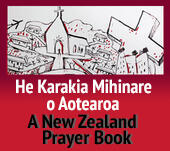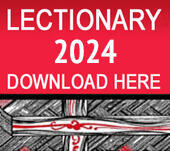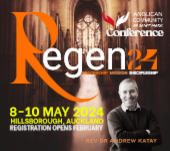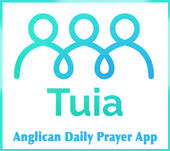| Bible Text: Romans 1 |
| Ni Sa Bula! Malo e lelei! Talofa lava! Namaste! Kia ora tatou! Greetings to you all my brothers and sisters in Christ! |
| My name is Sepiuta Hala’api’api. Everyone calls me Sepi. I am of Tongan origin but I was born in a town called Labasa, on the island of Vanua Levu in Fiji. I spent most of my life growing up in Suva, the capital of Fiji. |
| I come from a very strong Anglican background, whereby both my parents and their ancestors 2-3 generations back were staunch Anglicans back in the island kingdom of Tonga. The Anglican Church back in Tonga was referred to and continues to be referred to as “Siasi Ingilani” meaning “Church of England”. |
| I wish you all to take note that I do not have a theological background, nor am I a historian, nor a linguist. What I do have though is an environmental background with a Bachelor’s degree in Environmental Studies and Marine Science. I worked as a Fisheries Research Officer for almost 6 years before I decided to move on to do fulltime Youth ministry. For the last 3 years I have worked as a youth worker in our Diocese of Polynesia. |
| A couple of months ago, I received an email from Archbishop Moxon, stating that my name was put forward by my Diocese as one of three presenters to this Hui. The first task on my list was to clarify with my Archbishop-elect Halapua why on earth had my name been put forward, especially since, as mentioned, I was not a theological academic. |
| But having gone through the purposes and history of the past Huis, I thought that maybe the Church needed to hear the views of a young lady, brought up in the Pacific Islands, where life was still in community setting, where the Gospel had only reached our shores more recently than New Zealand, where religion and culture takes precedence in our daily lives as islanders, and also where western values continued to influence and shape us. |
| Yesterday, as part of our introductions, T-Pasefika raised a point on the influence of westernization on our local people and used the example of the changing dress code. [leaves to fully clothed; from fully clothed to bikini]. I wish to give a contrasting example of the impact of Christianity. As you may know, Fiji was known in history for cannibalism, and it wasn’t until the Gospel reached our shores, that we saw the light, and learnt that it was wrong to murder, let alone eat one another. |
| With all due respect to the forum, whilst preparing for this Hui, I couldn’t help but think of my background studies and try my best not to compare this Human Sexuality issue to the study of the sexual behaviours and reproduction of different animal species through asexual, homosexual, bisexual and heterosexual mating methods. I believe we were created different from those in the animal kingdom and as we were created in God’s |
| image, we, the human race, are a level above the animal kingdom. So please bear with me as I attempt the two questions given with my own lens view. |
| Q1. What is your approach to this text using Hermeneutics? |
| Comparing the given Bible text (Romans 1) to other Bible texts given for this Hui, I found that St Paul was more direct, straight forward, literally clear to understand, and the Scripture was able to interpret itself for me. |
| As a Pacific Islander, I decided to read 2-3 English versions, then I moved on to the Fijian translation and then the Tongan translation of this text and I found out that the interpretations all portrayed the same meaning of the text. I am not too sure what the original text would have read before it was translated to English but I believe that these were the exact words and meanings portrayed – in particular verses 26-27. |
| While I felt it was important to do some background research on the history of St Paul, his journey, and the reasons for his letters to people in different parts of the world at the time, as well as the carriers of these letters, for instance, Phoebe, I also found that this epistle was not specifically for the Romans, but is also an encouragement to all believers – St Paul and the Jewish believers, as well as the Gentiles like you and I today. |
| It sounds pretty tough with the structure of the letter, in that St Paul starts off his letter with a greeting and telling the people of his prayers for them, followed by stating the theme of his letter.(vs. 17). He then goes straight to talking about God’s wrath against mankind. |
| Q2. What does God say to you as you look at the text to help the Church hear what the Holy Spirit is saying?" |
| My understanding of what St Paul is boldly speaking is that when humankind failed/fail to acknowledge God, refused to honor God, refuse to worship God, and suppressed to His Truth, our relationship with God is broken. |
| St Paul mentions a list of sins and two verses (vs. 26-27) in particular directly address homosexuality as a sin. So that is my frank understanding of this issue. |
| I was also interested in finding out what St Paul meant when he used the words “so God gave them over to…” (vs. 24, 26, 28). |
| One commentary I picked up explains that when we refuse to acknowledge honour and worship God, when we suppress His Truth, God hands us over to the power of what we really want, only to discover that we become slaves of what we thought we wanted. |
| Romans 1 tells us that the real danger of sin is that God may give us over to it, and the very sin that we think we are enjoying will actually begin to have power over us and eventually we will wither not be able to get out of it or not even want to and it will have us. |
| The question most young people would ask with regards to God’s actions, as described in Romans 1, is “So that’s it?” |
| My way of picturing God’s actions is that He still has a hold on us – even if He lets us do things of our own free will. It’s like a parent warning their child not to play with matches |
| or play with a sharp knife and the child insists and disobeys. Some parents would say, “Ok fine! Do what you want but you will see...” The child gets hurt and learns his/her lesson and the parent, even though has left the child to make his/her own choice, still waits in love to comfort the child whilst knowing the child has learnt a lesson and dares not to play with matches or sharp knives again. Perhaps the innocence of the children like in this case is one reason why our Lord says, |
| “ Let the little children come to me and do not hinder them, for the kingdom of God belongs to such as these.” [Luke 18:16] |
| Conclusion |
| To conclude, as a believer, I believe that Christ’s salvation has brought us back to God and fixed the broken relationship. |
| “You see, at just the right time, when we were still powerless, Christ died for the ungodly. Very rarely will anyone die for a righteous man, though for a good man someone might possibly dare to die. But God demonstrates his own love for us in this: While we were still sinners, Christ died for us. Since we have now been justified by his blood, how much more shall we be saved from God’s wrath through him! For if, when we were God’s enemies, we were reconciled to him through the death of his Son, how much more, having been reconciled, shall we be saved through his life! Not only is this so, but we also rejoice in God through our Lord Jesus Christ, through whom we have now received reconciliation. [Romans 5:6-10] |
| As a youth leader in the 21st century, I feel accountable to God for what I teach my young people about the Gospel. I personally feel that we as leaders must be bold enough to preach His Truth and teach our young flock what sin is and the evil of sin. Unless we know and understand the depth of our sins, we will not grow to appreciate the height of his Salvation. |
| Blessings! |

















Comments
Log in or create a user account to comment.